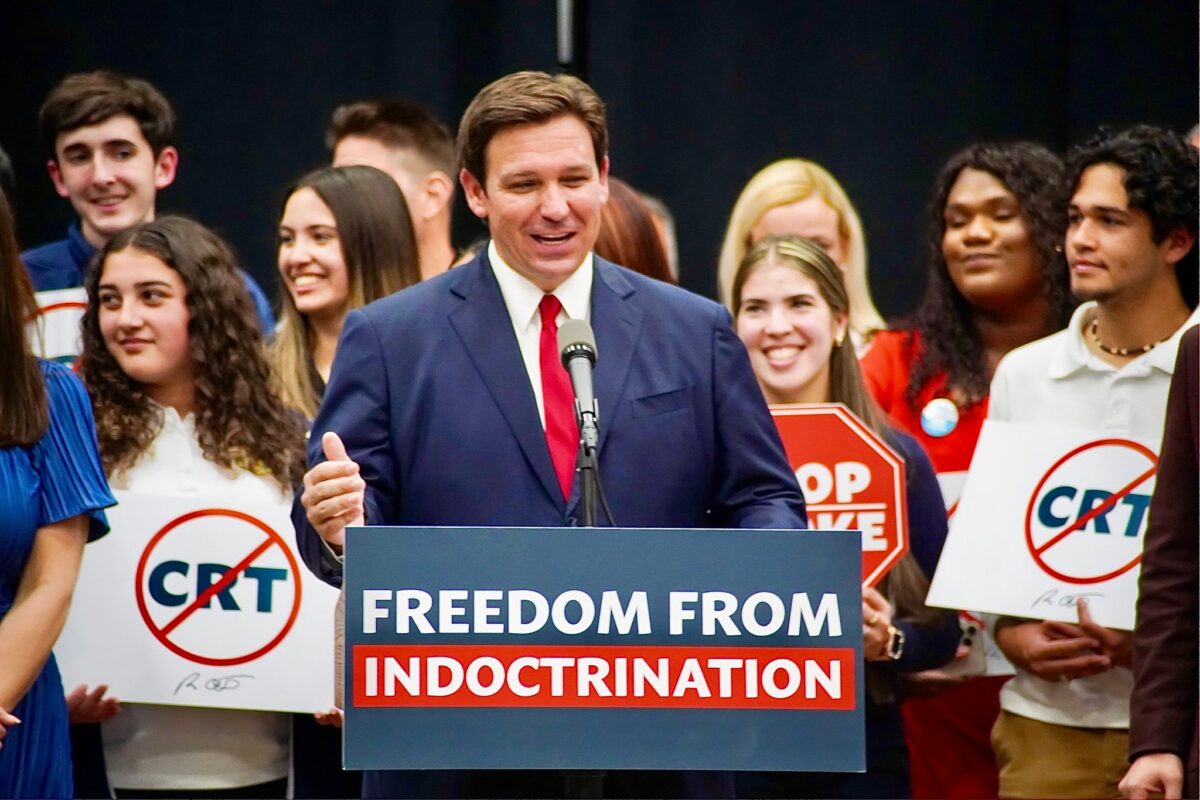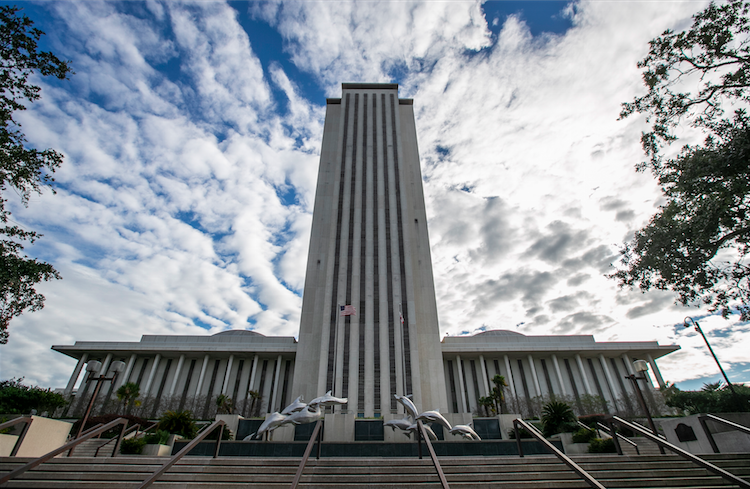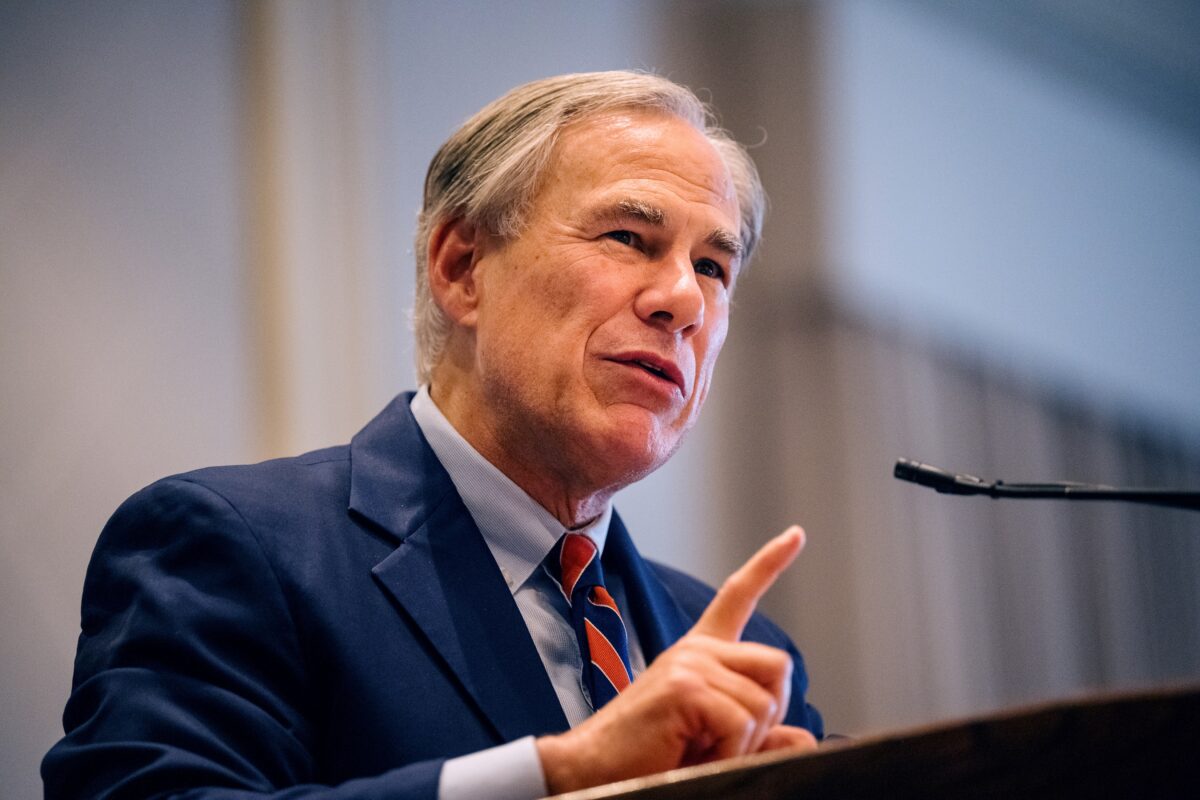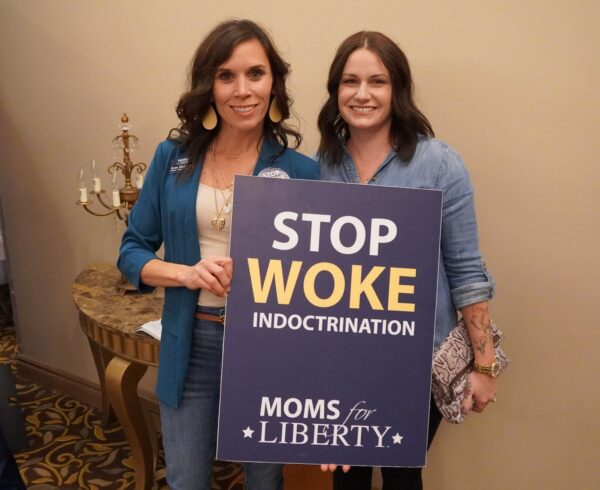


Public school districts across Florida are working to comply with several new state laws designed to stop the sexualizing of young school children and the indoctrination of students with racially prejudicial theories.
As a result of the legislation, all books and other materials in school libraries and classroom book collections must be inventoried and reviewed by state-certified media specialists.
Recommended reading lists, newly purchased books, and donated books are also to be scrutinized.
The specialists are expected to be drawn from working or retired librarians and media-certified school personnel who have undergone compulsory training from the Florida Department of Education (FDOE).
According to an FDOE memorandum, by July 1, 2023, and annually thereafter, every school district superintendent must certify that all librarians and media specialists in their employment have completed the required online book evaluation training.
The training prepares the specialists to evaluate a school’s literature and multi-media materials to determine if they can be made available to students without violating the following state-specified standards of appropriateness.
No materials, printed or digital, including books on recommended reading lists, may contain pornography, according to the standards.
The training program uses this Merriam-Webster Dictionary’s definition of the word pornography as a guide: “The depiction of erotic behavior (as in pictures or writing) intended to cause sexual excitement.”
According to the FDOE training guide, the material must not “predominantly appeal to a prurient, shameful, or morbid interest,” or be obviously offensive to the community’s prevailing standards of what is suitable for minors.
All material must be “appropriate for the grade level and age group” to whom it is made available.
Florida law prohibits K–3 students from receiving any type of teaching or instructional materials dealing with sexual orientation or gender identity.
Only materials that are deemed “age-appropriate” can be made available to students in higher grade levels.
The statute also gives parents the right to appeal an “age-appropriate” determination they disagree with in court.
It is a third-degree felony in the state of Florida for any adult to provide pornography to a minor.
The FDOE has advised school personnel to “err on the side of caution” when determining if a book is “developmentally appropriate” for student use.
Teachers found guilty of offering a banned book to students could face up to five years in prison and a $5,000 fine.
“Given the rapid spread of book bans across the country, it seems inevitable that the resulting climate of caution and fear will result in a reluctance of teachers, administrators, and librarians to take risks that could affect their own employment, their budgets, their reputations, and their personal safety,” according to a report issued by PEN America, a national civil liberties advocacy group.
PEN America is a New York-based, non-profit organization dedicated to “championing the freedom to write [and] recognizing the power of the word to transform the world.”
Comparing the current atmosphere with the anti-communist fervor that swept through America in the 1950s known as “The Red Scare,” PEN has dubbed the present situation “the ed scare.”
Read More
At least 15 documented cases, including one in Florida, of criminal charges filed in the 2021–2022 school year over the distribution of obscene or pornographic material in school and public libraries were reported by PEN.
Local law enforcement eventually dropped those cases.
Social media has exploded with pushback from Florida educators objecting to the new laws, which some describe as book banning and censorship.
Many of the state’s teachers view the materials evaluation requirement as a waste of time and resources.
In a recent statement, Andrew Spar, president of the Florida Education Association, the state’s largest labor union, addressed the atmosphere of confrontation.
“While Gov. DeSantis seeks to punish and divide, we seek to unite.
“We respect the voices of parents, teachers, school boards, administrators, and students.
“Our schools don’t need to go back to the 1950s; we need to move forward toward 2050,” Spar said in support of further liberalizing sexual norms.
The book evaluation training guide requires that the approved print and digital material “support the broad racial, ethnic, socioeconomic, and cultural diversity” of Florida’s students.
The content of the material should not reflect “unfairly upon persons because of their race, color, creed, national origin, ancestry, sex, religion, disability, socioeconomic status, or occupation,” according to the FDOE guidelines.
The training program urges evaluators to avoid titles that contain “unsolicited theories that may lead to student indoctrination.”
Materials that teach that an individual, by virtue of his or her race, color, sex, or national origin, is inherently racist or oppressive must be rejected.
The instructional materials chosen must be “accurate, objective, balanced, noninflammatory, and current.”
Titles selected must adhere to the principles of individual freedom as outlined in Florida state law:
The state training asks the specialists to look for books that advocate good stewardship of the environment, humane treatment of animals, promote thrift, and expound on the dangers of substance abuse.
“Whenever appropriate for social science, history, or civics courses, the materials submitted must contain the Declaration of Independence and the Constitution of the United States,” reads the training guide.
Florida law mandates that school librarians and media directors compile a list of all books and digital materials that is available to their students. The online database of titles must be accessible to parents and community members.
By statute, any parent or community member may challenge any book, pamphlet, video, or recording, with the exception of a Teacher’s Edition of a textbook.
The compilers of PEN America’s Index of School Book Bans found that 41 percent of the banned titles contained LGBT themes and 40 percent had main characters that were people of color. In recent years, an increasing number of books containing LGBT themes and more racially-diverse characters have been published.
Twenty-two percent were banned because of sexual content and 21 percent for focusing on racism.
The most frequently banned book was “Gender Queer: A Memoir,” by Maia Kobabe.
Ellen Hopkins was the most frequently banned author.
The index analyzed 2,552 instances of books being banned nationwide from July 2021 to June 2022, a figure researchers believe is underreported.
Since the completion of the initial study, PEN analysts found an additional 139 instances of book banning nationally.
The bans included in the original study involved 1,648 titles penned by 1,261 different authors.
Book bans were reported in 138 school districts across 32 states.
Of the 32 states, Texas had the most instances, with 801 bans in 22 school districts. Florida posted 566 in 21 districts, Pennsylvania had 457 in 11 districts, and Tennessee rounded off the top four with 349 bans in six school districts.
PEN America researchers estimate that 40 percent of the reported public school book bans were connected with “either proposed or enacted legislation, or to political pressure exerted by state officials or elected lawmakers to restrict the teaching or presence of certain books or concepts.”
The PEN report said, “The resulting harm is widespread, affecting pedagogy and intellectual freedom and placing limits on the professional autonomy of school librarians and teachers.
Read More
“Public schools that ban books reflecting diverse identities risk creating an environment in which students feel excluded, with potentially profound effects on how students learn … in a pluralistic and diverse society.”
Working in tandem with the book bans are what PEN calls “educational gag orders,” like Florida’s new law that bans the teaching and provision of materials dealing with sexual orientation and gender identity to very young K–3 school children.
As an indication of the recent rise and impact of the parental rights movement on school policies and legislation, the analysis identified over 50 citizen groups—the top eight of which had more than 300 local chapters across 38 states—pushing to ban what they view as objectionable books.
One of the largest such groups is Moms for Liberty, with over 200 chapters nationwide.
Seventy-three percent of the organizations were formed in the last two years.
According to the PEN report, “These parental and community groups have played a role in at least half of the book bans enacted across the country during the 2021–2022 school year.”
The report added that such parent-led groups are “swarming school board meetings, demanding newfangled rating systems … using inflammatory language about ‘grooming and pornography,’ and even filing criminal complaints against school officials, teachers, and librarians.”
The success of the Florida Citizens Alliance in pressuring a school system to apply warning labels to over 100 books was cited by the index as an example of the effectiveness of such organizations.
PEN warns that some of these groups “espouse Christian nationalist views.”
According to PEN, the “atmosphere of intimidation” created by the groups undermines the ability of communities to “discourse” in a “measured way.”
“[Book] challenges are coming with such increased frequency … that [school officials] struggle to keep up, as well as to withstand the heightened political pressure and public scrutiny.”
PEN said that educators have been taken by surprise by the “degree of focus and determination” displayed by citizen groups in the pursuit of their objectives.
Public libraries are also being targeted “with calls to ban books; efforts to intimidate, harass, or fire librarians; and even attempts to suspend or defund entire libraries,” according to the report.
Read More
The PEN American Index characterized the movement to ban books as “undemocratic,” because it imposes restrictions on all students “based on the preferences of those calling for the bans.”
Nearly 96 percent of the 2,532 bans identified by the index did not follow the guidelines for book challenges recommended by the American Library Association and the National Coalition Against Censorship.
Books for young adults comprised nearly 50 percent of the books banned.
Three-quarters of the total books banned were fiction, and just under 25 percent were non-fiction.
PEN activists worry that book bans harm students “who have a right to access a diverse range of stories and perspectives … and especially [harms] those from historically marginalized backgrounds who are watching their library shelves emptied.”
The effect of the bans, together with the “punitive, surveillance-oriented” attitudes of those in some states who are advocating them is “chilling” to teaching and learning, said the PEN report.
The study also cited a recent public opinion poll that shows a majority of Americans across the political spectrum oppose book bans.




